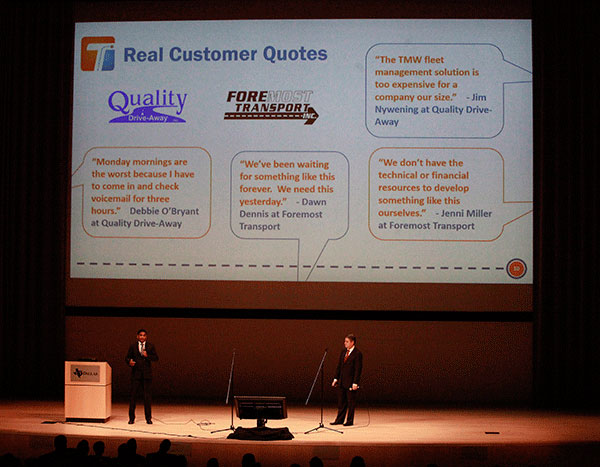It’s fascinating to watch pitch events; you learn about new ways to solve old problems and possibly even witness the first bloom of the next Big Thing. The 2015 UT Dallas Business Idea Competition didn’t disappoint. It included everything from an Indian food truck to a geo-location service to track drivers.
The arrival of top ideas at this year’s annual entrepreneurial contest recently attracted an audience of nearly 1,000 people to watch the Final Pitch. As I looked around the Edith O’Donnell Arts and Technology Lecture Hall, I was struck by how this competition has evolved during its short life. The Final Pitch, held on November 20, featured the top six teams, winnowed from an original field of 100. Three undergraduate and three graduate teams presented their ideas to ABC show Shark Tank judge Mark Cuban and three other “celebrity” judges: Eve Mayor, founder and CEO of Social Media Delivered; Lea Nesbit, CEO and co-founder of Natural Dental Implants Inc.; and Swapnil Bora, winner of the 2010 Business Idea Competition and co-founder and CTO of ILumi.
“Realize that there are people competing with you and you’re going to have to go out there and do the work in order to be successful. So one simple message: ideas are easy, doing the work is hard. You have to do the work,” Mark Cuban says.
In years past, the Final Pitch was held in a Naveen Jindal School of Management classroom in front of an audience of a few faculty and staff members, a panel of judges, and maybe a handful of students. But this year, we were lucky enough to convince Cuban, one of the original “sharks” and owner of the Dallas Mavericks, to headline the event, which certainly contributed to the full house and the excitement in the air.
Cuban’s advice: “Realize that there are people competing with you and you’re going to have to go out there and do the work in order to be successful. So one simple message: ideas are easy, doing the work is hard. You have to do the work.”
The top prizes went to two intriguing and innovative teams that both used technology, one to improve efficiencies in the transport industry and the other to create a more connected home, vehicle, and entertainment center. The top three finalists in the graduate division were all teams made up of Jindal School students.
Jindal School Executive MBA and MS in Innovation and Entrepreneurship students Kiran Devaprasad and William White developed a geo-location service, TraceIt, for the transport industry, to win the top prize in the graduate division. First place in the undergraduate division went to WeBe, dreamed up by computer science freshman Raviteja Lingineni, who designed a platform that weaves the Internet of Things together using a universal standard communications protocol.
TraceIt is interesting because it serves up a technological solution for an industry that typically doesn’t get a lot of technology innovation and is a little old school. The team’s solution tracks and reports the location of drivers transporting new vehicles from the manufacturer to the dealership where they will be sold.
Devaprasad and White presented the problem to the judges and audience like this: a typical transport company moves around 60,000 loads each year, using about 250 drivers. Because the dealers want to know when to expect their vehicles, the transporters must use dispatchers, who spend about 32 man hours daily, at an annual cost of about $350,000 trying to track the drivers.
Location management software is loaded on the driver’s smartphone, and using geo location, provides up-to-the-minute location information through secure cloud-based infrastructure. The team estimates cost to run around $180,000 a year, a 50-percent internal operational cost savings for their clients.
“This, in turn, increases not only their internal customer satisfaction, but customer satisfaction for all of their external customers as well—the dealers and the manufacturers,” White says.
It will be interesting to watch TraceIt and see what its product could do for the transport industry.
Having an “app for that” at one time was kind of humorous, but having an app for everything is now overwhelming.
The undergraduate top winner, WeBe, enables smart devices across the Internet of Things to communicate with each other, such as refrigerators communicating with the home thermostat, a retail outlet recognizing a consumer’s preferences or vehicles mirror positions automatically adjusting to the driver. The system utilizes proprietary embedded technology and a cloud-based system’s architecture.
Having an “app for that” at one time was kind of humorous, but having an app for everything is now overwhelming. I found this product interesting and am interested to see if its innovator can pull off the universal system and bring it to market.
Pitch events are always interesting, and this one didn’t disappoint. I hope to see some of these business ideas come to life. It’s always gratifying to watch UT Dallas Business Idea Competitions, which are hosted by the university’s Institute for Innovation and Entrepreneurship, help put entrepreneurs on the map.
Winners of the 2015 Business Idea Competition
Graduate Category
First Place, $5,000
TraceIT: Kiran Devaprasad, William White. Business idea: Geo location service to track drivers and loads.
Second Place, $2,500
Dosawala @ UTD: Ritu Pandey, Pavan Kumar Kanteti. Business idea: Indian food truck.
Third Place, $1,500
TravelHop: Olia Bosovik, Neha Kashyap, Jeanne Whitesides, Chiao Chang. Business idea: Budget-focused travel site.
People’s Choice Award, $1,000: Dosa Wala at UTD
Undergraduate Category
First Place, $5,000
WeBe: Raviteja Lingineni. Business idea: Electronic tag to provide information to smart devices.
Second Place, $2,500
ClassBuds: Noa Barazani. Business idea: Mobile app to connect students in classes.
Third Place:, $1,500
Torus: Christian Cortes, Jai Ghanekar and Hans Ajieren. Business idea: a platform that combines sensors and an app to deliver a parking solution at crowded parking lots at universities and shopping malls.
People’s Choice Award, $1,000: Torus
For a daily dose of what’s new, now, and next in Dallas-Fort Worth innovation, subscribe to our Dallas Innovates e-newsletter.


































































